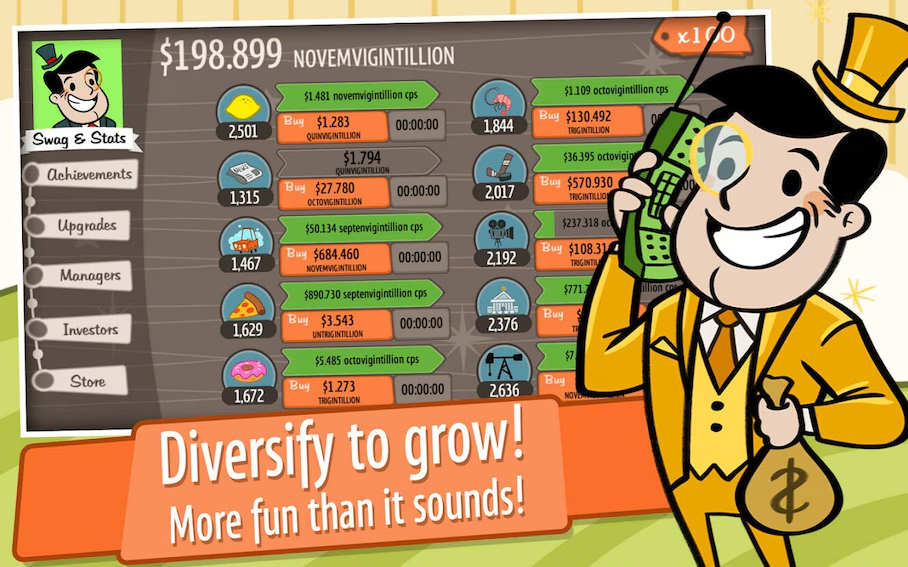Idle games, often known as incremental games, captivate players with their steady, satisfying progression and laid-back mechanics. Titles like Idle Heroes, AdVenture Capitalist, and Hero Tale exemplify the genre’s appeal, as they allow players to enjoy the gameplay without the need for constant interaction.
The process of localizing games in this genre introduces unique challenges, as translators must adapt terminology, humor, and interfaces to maintain the games’ simplicity while still ensuring the ability for global player engagement. This article dives into the specific localization hurdles presented by idle games, and how these elements shape the player experience worldwide.
Consistent Terminology: Building Familiarity and Engagement
In idle games, where players engage in repetitive actions and long-term goals, consistent terminology is vital for building familiarity and keeping players entertained. Game translators, therefore, must ensure that terminology for resources, upgrades, and skills, are clear, intuitive, and consistent across multiple iterations and updates.

Hero Tale offers a good example of the importance of consistent terminology. The game includes words specific to RPG and adventure elements—such as character abilities, resources, and upgrade paths—that require precise and engaging localization. Since Hero Tale encourages players to steadily enhance their character over time, any inconsistency in terminology could result in player confusion or frustration, and ultimately disrupt their immersion and the flow of their progress.
Similarly, in Idle Heroes, a clear vocabulary is essential in describing various characters, abilities, and level-up options. Maintaining consistent terms across languages not only keeps gameplay smooth for all audiences, but also helps foster a sense of connection among players across cultures.
Minimalist User Interface: Fitting Text into Limited Spaces
Idle games often use a minimalist UI, which can result in localization teams having to fit text into highly compact spaces. Minimal wiggle room means translations must be rendered with the utmost clarity and economy. Maintaining the succinct style that defines the genre is essential to preserving the feel of the games, and also necessary, given their literal space constraints.
Localization efforts in Hero Tale, for instance, required translators to account for the game’s straightforward interface which highlights character stats, items, and quests. Linguists frequently found themselves having to focus on adapting descriptions and menu items to fit the limited screen space while still retaining essential information. The challenge lay in balancing brevity with clarity, so that players could easily understand game functions, no matter the language.
Similarly, in AdVenture Capitalist, in which players manage an economy in real-time, the UI displays stats, upgrades, and profits. Condensing text to fit neatly into designated areas become crucial for translators, and their collaboration with designers allowed the layout to remain intuitive and visually appealing so the overall player experience was preserved.
Cultural Nuance and Humor: Connecting with Players
Despite their simplicity, idle games often incorporate humor, wordplay, or cultural references that add flavor to the playing experience. Thoughtful adaptation of these elements, therefore, can help a game to resonate more profoundly on a local level because it adds layers of familiarity and enjoyment that might otherwise be literally lost for lack of translation.
In Egg, Inc., for instance, humor is used in descriptions of upgrades and achievements, often with playful references to farming and entrepreneurial spirit. Translators need to adapt these jokes to fit cultural contexts, so the humor doesn’t disappear or feel out of place. A subtle-yet-engaging approach to translating games like this can help maintain the game’s charm for global audiences.
In Hero Tale, too, humor is used to add personality to the game’s idle RPG mechanics, with character descriptions and upgrade names that play on RPG tropes. Localizing these amusing elements involves adapting jokes to ensure they make sense in the target language while also preserving the playful tone. Localizers may adjust character names, skill descriptions, or dialogue in this process to better connect with regional audiences.

We find another example of humor in AdVenture Capitalist, where it is rooted in economic and business themes. Here, developers used playful terms to reflect entrepreneurial ambition. Translators adapting the game for a global audience needed to balance this humor with accessibility: they worked to keep the tone light and relatable for players from diverse cultural and economic backgrounds.
Continuous Updates: Adapting Quickly for New Content
Idle games are frequently subject to updates, which add new content or seasonal events to keep players invested over time. Localization teams must remain creative and flexible as they work to integrate new terminology and mechanics without disrupting the game’s established flow. A seamless partnership between translators and developers is key to effectively incorporating fresh content while still maintaining consistency with existing terminology. This collaborative approach ultimately ensures a cohesive player experience, even as new elements are introduced.
Idle Heroes offers a good case study for a game that introduces new characters and gear in its updates. A dynamic glossary and style guide enable localization teams to adapt to these changes efficiently, thereby keeping the player experience smooth and consistent across languages.
Balancing Simplicity with Engagement

One of the defining features of idle games is their ability to keep players engaged without overwhelming them. Localization must strike this same balance as they seek to preserve the simplicity of gameplay while enhancing immersion and enjoyment.
When localizing AdVenture Capitalist, for example, translators worked to maintain a lighthearted, motivational tone to keep players connected to the game’s progression goals. Similarly, in Idle Heroes, translators took care to add flavor to character descriptions and skill sets in order to keep the content interesting, while also not bogging players down with excessive details.
By balancing simplicity with engaging language, localization teams help make idle games not only accessible to players worldwide, but also truly fun and immersive.
The Takeaway
The localization of idle games requires a delicate balance of clarity, consistency, and cultural nuance. By adapting game terminology, UI elements, and humor thoughtfully, localization teams create a smooth, enjoyable experience for players worldwide. In games belonging to this genre, a well-localized experience ensures that players can fully immerse themselves in the incremental journey in a deeply satisfying, and universally relatable way.
